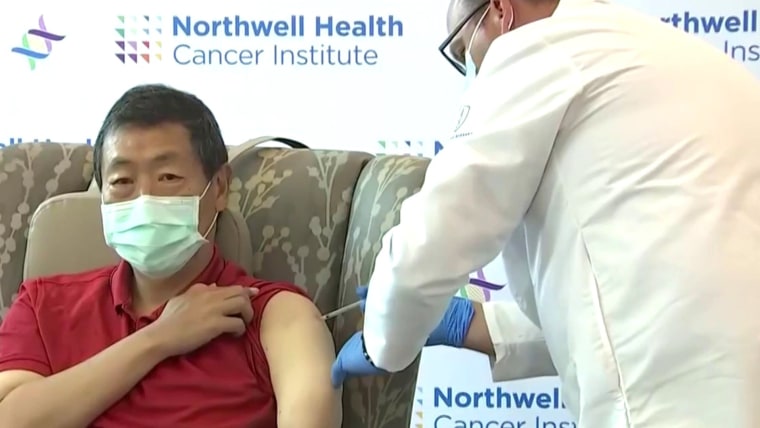Now that the Food and Drug Administration has fully approved a Covid-19 vaccine, the Pfizer-BioNTech shot dubbed Comirnaty, more employers and universities are mandating immunization. Some people may seek medical exemptions to not receive the shots, but what medical conditions would warrant exemptions?
Individual companies and other institutions can determine what medical exemptions they will allow for Covid vaccination and may leave the decision up to people’s doctors.
Full coverage of the Covid-19 pandemic
“People will seek an exemption for all sorts of reasons, but there are not very many valid ones,” said John Grabenstein, director of scientific communications for the Immunization Action Coalition, a vaccine education group, and a former executive director of medical affairs for vaccines at Merck.
Typically, medical exemptions are based on “contraindications” — reasons not to administer a product — cited by the FDA, along with guidance from the Centers for Disease Control and Prevention and other leading medical groups.
In the case of the Pfizer vaccine, the list is quite short: The only contraindication listed by the FDA is a “known history of a severe allergic reaction (e.g., anaphylaxis) to any component of COMIRNATY” — in other words, if a person is severely allergic to an ingredient in the vaccine.
Similarly, the CDC says Covid vaccines are contraindicated in people who have had severe allergic reactions or immediate allergic reactions — occurring within four hours and including symptoms such as hives, swelling and wheezing — after receiving any ingredient of a Covid vaccine or after previous doses of that vaccine.
That does not mean that anyone with a history of any kind of allergies or anaphylaxis is medically unable to get a Covid vaccine.
“So if you’re allergic to peanuts, it’s irrelevant, because there are no peanuts in the vaccines,” Grabenstein said. “If you’re allergic to pollen, it’s irrelevant, because there’s no ragweed. If you’re allergic to penicillin, there’s no penicillin in the vaccines. So you have to be allergic to a component of the vaccine.”
The number of people who have had anaphylactic reactions to Covid vaccines is very small, about 2 to 5 cases per million doses, said Dr. Niraj Patel of Atlanta, chair of the American College of Allergy, Asthma and Immunology’s Covid-19 Vaccine Task Force.
“Putting this into perspective, you’re as likely to get struck by lightning as you are to have an allergic reaction to a Covid vaccine,” he said.
Patel noted that doctors still are not sure which component or components of the vaccines might trigger anaphylaxis. In the case of the mRNA vaccines made by Pfizer and Moderna, a suspected culprit is polyethylene glycol, or PEG. With the Johnson & Johnson vaccine, it could be polysorbate 80. Both compounds are used in other common products that people may encounter regularly. PEG, for example, is a common ingredient in over-the-counter laxatives. And polysorbate 80 is used as an emulsifier to make foods like ice cream and pudding creamier.
Because the ingredients differ between the mRNA vaccines and the Johnson & Johnson vaccine, it is possible that a person who could be allergic to an mRNA vaccine could safely receive the Johnson & Johnson vaccine, and vice versa, Patel said, though he advised consulting with an allergist first.
What about other medical conditions?
As for any concerns about Covid vaccines in immunocompromised people, Patel said the vaccines are just as safe as they are in the general population, and in fact the FDA recently authorized a booster shot of either the Pfizer or the Moderna vaccines for some patients with very weakened immune systems, such as organ transplant recipients, because they need extra protection.
Cancer patients who are undergoing chemotherapy or other treatments that can weaken their immune systems also can safely get the Covid vaccines but should talk with their physicians about the timing of the shots, said Dr. Julie Gralow, chief medical officer for the American Society of Clinical Oncology.
Download the NBC News app for full coverage of the Covid-19 pandemic
The Covid vaccines do not contain any live virus, “so you’re not worried that you’re going to give somebody a Covid infection,” she said, but some patients may be “at a point in their treatment where we just know they’re not going to mount an immune response.” In those cases, oncologists may recommend getting a Covid vaccine at another time, not because it may cause harm, but so they can be more confident the dose will work as it is supposed to.
The CDC says Covid vaccines can be given to pregnant women and most people with underlying medical conditions as long as they do not have severe allergies to the vaccine.
Patients can discuss their concerns with their personal physicians, who may make suggestions about the timing or the type of vaccine.
In the rare cases when someone develops heart inflammation known as myocarditis or pericarditis after an mRNA vaccination, for instance, the CDC advises that patients seeking second doses wait until their symptoms have resolved. And patients with Guillain-Barré syndrome may decide, in consultation with physicians, to receive an mRNA vaccine rather than the Johnson & Johnson vaccine, which has been linked to a potentially increased risk of the syndrome.
The bottom line, Grabenstein said, is that the vast majority of people can safely receive a Covid vaccine, so not very many should be able to claim true medical exemptions.
“We’ve gone past the 200 millionth person to have gotten Covid vaccination just in the United States alone,” he said. “So we now have extensive safety experience with these vaccines.”
Follow NBC HEALTH on Twitter & Facebook.
"may" - Google News
September 02, 2021 at 04:00PM
https://ift.tt/3zET9Si
As mandates roll out, some may ask for medical exemptions. What's really valid? - NBC News
"may" - Google News
https://ift.tt/3foH8qu
https://ift.tt/2zNW3tO
Bagikan Berita Ini















0 Response to "As mandates roll out, some may ask for medical exemptions. What's really valid? - NBC News"
Post a Comment